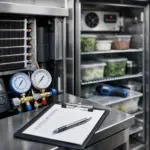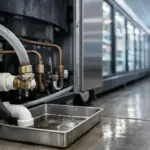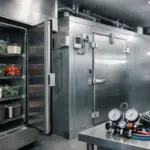
Commercial Refrigeration Compliance: Health Inspection Refrigeration Checklist for Boston Businesses
Commercial Refrigeration Compliance: Health Inspection Refrigeration Checklist for Boston Businesses
For every restaurant, café, and food retailer in Greater Boston, commercial refrigeration compliance Boston is more than a regulatory box to tick—it’s the foundation of safe, successful operations. Health inspectors in Massachusetts are vigilant, and even a minor lapse in refrigeration safety can mean costly violations or reputational damage. Is your business truly inspection-ready? This guide delivers a practical, updated refrigeration safety checklist tailored for Boston, backed by the latest commercial fridge regulations MA and proven food safety practices.
Why Commercial Refrigeration Compliance Matters in Boston
Boston’s thriving food scene depends on vigilant food safety. The city adopts the FDA Food Code, requiring all perishable foods to be stored at 41°F (5°C) or below and frozen items at 0°F (-18°C) or below[1]. Failure to comply can lead to:
- Failed health inspection refrigeration reviews
- Foodborne illness risks and public health violations
- Product loss, business interruptions, or even license suspension
Staying compliant isn’t just about avoiding fines—it’s about protecting your customers, your inventory, and your reputation.
Key Commercial Fridge Regulations in Massachusetts
State and Local Codes
- Temperature Logs: All commercial kitchens must maintain daily temperature logs for every refrigeration unit. Inspectors will check these logs for accuracy and consistency[1].
- Annual Inspections: Massachusetts law requires annual field inspections for refrigeration systems above certain capacities. These must comply with ASHRAE 15 and state-specific standards[3][5].
- Building Codes: The latest MA Building Code (10th Edition) allows the use of new, low-GWP (A2L) refrigerants, provided systems meet updated safety standards[2].
- EPA Regulations: Under Section 608 of the Clean Air Act, it is illegal to knowingly vent refrigerants. Only certified technicians may service or dispose of refrigeration systems, and strict records must be maintained[4].
Boston Health Inspection Priorities
- Correct refrigerator and freezer temperatures
- Accurate, calibrated thermometers in every unit
- Separation of raw/cooked foods and proper labeling
- Clean, well-sealed doors and gaskets
- Evidence of routine maintenance and cleaning
For detailed city-specific requirements, review Boston’s health code reference.
Your Refrigeration Safety Checklist
Use this refrigeration safety checklist to prepare for inspections and ensure year-round compliance:
- Daily: Log temperatures for all cold storage units (refrigerators and freezers). Investigate any readings above safe thresholds immediately.
- Weekly: Inspect and clean door gaskets, shelves, and coils. Check for signs of frost buildup, leaks, or unusual noises.
- Monthly: Calibrate thermometers and digital sensors to ensure accuracy. Review food labeling and rotation for FIFO compliance.
- Biannual: Schedule professional preventive maintenance by certified technicians to inspect refrigerant levels, compressors, and electrical connections.
- Annually: Arrange for required state inspections on applicable systems. Update compliance documentation and employee training.
For a comprehensive preventive maintenance plan, see our Commercial Refrigeration Preventive Maintenance Plans.
Food Safety Refrigeration: Boston Business Essentials
Local inspectors focus on more than cold temperatures—they assess the entire food safety chain. Key tips:
- Store raw meats below ready-to-eat foods to prevent cross-contamination
- Label and date all foods entering storage; discard expired items promptly
- Keep storage areas uncluttered and ensure airflow around food items
- Use digital monitoring and alarm systems for real-time alerts on temperature excursions
Want to protect your inventory and streamline compliance? Discover the benefits of smart refrigeration monitoring for Boston businesses.
Refrigeration Maintenance Standards for MA Businesses
Adhering to refrigeration maintenance standards isn’t just about passing inspections—it extends equipment life, reduces energy costs, and prevents emergencies. Massachusetts regulations require that commercial refrigeration systems (above certain capacities) align with ASHRAE and ANSI/IIAR standards for installation, operation, and safety[3][5].
- Ensure all maintenance is performed by licensed, EPA-certified technicians
- Keep detailed service records for all refrigeration work, repairs, and refrigerant handling
- Prepare for the transition to new, low-GWP refrigerants—review your equipment’s compatibility and plan for upgrades as required by state and federal law[2][4]
Read our guide to energy-efficient refrigeration upgrades to learn more about staying ahead of regulatory changes and reducing operational costs.
How Royal Cooling Helps Boston Businesses Stay Compliant
Royal Cooling specializes in helping Massachusetts business owners achieve—and maintain—commercial refrigeration compliance Boston. Our experts offer:
- 24/7 emergency repair and rapid response for walk-in coolers and freezers: emergency walk-in cooler repair
- Custom preventive maintenance programs to ensure inspection readiness
- Smart monitoring systems for real-time compliance and food safety
- Guidance on code compliance, refrigerant management, and equipment upgrades
- Professional installation and documentation to pass all health and building inspections
Explore our full range of commercial refrigeration services or schedule a compliance consultation today. For immediate assistance, contact Royal Cooling—your trusted Cambridge and Greater Boston partner.
Resources for Business Owners
- 522 CMR 9.00: Massachusetts Refrigeration and Air Conditioning Systems Regulations
- EPA Refrigerant Management Requirements
- ASHRAE Safety Standards for Refrigeration Systems
FAQ: Commercial Refrigeration Compliance for Boston Businesses
- What temperature do my refrigerators and freezers need to maintain for health code compliance?
- Refrigerators must be at or below 41°F (5°C); freezers must be at or below 0°F (-18°C) to align with both FDA Food Code and Boston’s local health regulations.



